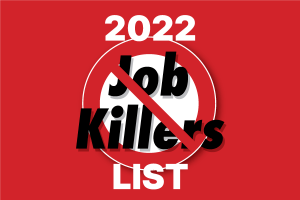 Two California Chamber of Commerce job killer bills that will lead to excessive costs and jeopardize thousands of high paying jobs in the state face a key hurdle today, as legislators work through remaining bills to close the 2022 legislative session.
Two California Chamber of Commerce job killer bills that will lead to excessive costs and jeopardize thousands of high paying jobs in the state face a key hurdle today, as legislators work through remaining bills to close the 2022 legislative session.
The two job killer bills were hastily introduced last week through a “gut and amend” process, leading the CalChamber and a broad coalition of business groups and local chambers of commerce to point out that the time remaining in the legislative session is inadequate for the necessary full discussion of the proposals.
The bills awaiting action today are:
- AB 2133 (Quirk; D-Hayward): Arbitrarily changes the state’s greenhouse gas (GHG) emissions reduction goal from 40% of 1990 levels by 2030 to 55%. By the state’s own estimate, this proposal will force 17 million gas powered cars off the road in the next 10 years; and
- SB 1137 (Lena Gonzalez; D-Long Beach): Threatens to eliminate thousands of high-paying California jobs and force California to import even more foreign oil by politicizing and undermining the California Geologic Energy Management (CalGEM) Division’s ongoing regulatory process regarding new requirements near oil and gas extraction sites by predisposing what setback requirements should be before the agency even begins its analysis.
Greenhouse Gas Emissions Reduction Proposal
In a statement released last week, CalChamber President and CEO Jennifer Barrera reiterated the CalChamber’s support of climate change laws and regulations that are “cost-effective, technology-neutral and promote the use of market-based strategies to reduce greenhouse gas emissions.”
AB 2133, however, does not take any of these considerations into account and will actually lead to excessive costs, hurting both California residents and businesses, she said.
The proposal undermines the existing public and transparent process at the California Air Resources Board (CARB), where hundreds of stakeholders have been engaged in a months-long inclusive Scoping Plan review.
Increasing the GHG 2030 emissions reduction target from 40% to 55% below the 1990 level would require the state to remove an additional 17 million gasoline vehicles off the road by 2030, according to data developed by CARB.
Additionally, CARB data shows that CARB’s initial modeling of scenarios in this range concluded them to be “economically and technically infeasible due to the current lack of low-carbon energy infrastructure, unavailability of technology, large job loss and high implementation costs.”
Threat to Oil and Gas Development
SB 1137 proposes a 3,200-foot minimum setback, prohibiting oil and gas activities within a specified proximity of homes, schools, and parks, and pollution controls surrounding active oil wells. This policy completely undermines the Governor’s own three-year process to enact rules for health and safety around oil and gas extraction facilities.
The proposal threatens approximately 8,000 jobs, including 3,000 high-paying jobs in the oil and gas industry, and another 5,000 jobs in supplying industries such as construction and trades.
“The approach offered in SB 1137 will do nothing to reduce California’s oil and gas energy demands,” Barrera said. “Instead, it will drive production out of California and force the state to rely on even more foreign oil imports that are produced in locations with less environmental protections than California.”
Arbitrary minimum setback requirements and pollution controls prescribed in the bill would affect 15,338 active and idle wells in California located within 3,200 feet of specified receptors in California. According to an Assembly Appropriations Committee analysis of a previous setback bill (also a job killer — AB 345; Muratsuchi; D-Torrance), the bill’s requirements could cost up to $4 billion in lost state revenue and subject the state to significant risk of legal liability under the takings clause of the U.S. Constitution. AB 345 was similar to SB 1137 and was stopped by the Legislature in 2020.
According to the California Energy Commission, California is relying more on foreign oil than at any time since the agency started tracking it in 1982. In 2018, California imported 370 million barrels, or 57% of the state’s crude oil supply, from foreign nations like Saudi Arabia (37%), Colombia (13%), and Iraq (8%). By comparison, in 1992, California imported 33 million barrels, or just 5% of its supply.
Banning in-state oil and gas production naturally increases the state’s dependence on foreign oil regimes with abysmal environmental and human-rights records. This approach would have no effect on GHG emissions, because it merely trades a reduction in California GHGs for GHGs emitted in less-environmentally protective foreign regimes.
CalGEM has a current process underway — where they have conducted seven local and virtual workshops across the state and received 45,000 public comments. The Governor and CalGEM have repeatedly said they want to rely on the best available science to determine any potential setback and ensure all stakeholders have input into the process.
This bill forces CalGEM to adopt arbitrary setback requirements, with very little legislative input, at the detriment of good jobs and California’s energy needs.
Staff Contact: Ben Golombek


